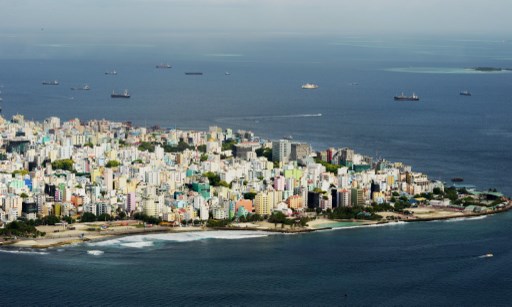
The Maldives on February 6, 2018 sought to reassure tourists they would be safe as governments warned their citizens to steer clear of the troubled honeymoon islands amid a spiralling political crisis.
/ AFP PHOTO
MALE, Maldives (AFP) — A decade after he swept to power in the Maldives’ first democratic elections, exiled opposition leader Mohamed Nasheed is again pushing for change — by force if necessary — as his island homeland spirals into crisis.
Nasheed made history in 2008 when he defeated Maumoon Abdul Gayoom — then Asia’s longest-serving leader — after three decades of unchallenged rule.
In the years that followed, the charismatic young president won international renown as a campaigner against climate change and the rising sea levels posing an existential threat to the low-lying Indian Ocean archipelago.
But he fled into exile after he was convicted and jailed in 2015 on a terrorism charge widely seen as politically motivated.
Now Nasheed, whose tumultuous life in prison and politics has earned comparisons to Nelson Mandela, is back in the global spotlight after a Supreme Court ruling that has plunged his homeland into chaos.
He is calling for help to depose President Abdulla Yameen, whose refusal to comply with the court’s order to release high-profile political prisoners drew international censure.
The surprise court ruling — since overturned after the president declared a state of emergency and arrested two top judges — opened a new chapter for the veteran opposition leader, who has appealed to regional superpower India to send in troops and restore democracy.
Nasheed spent decades building a pro-democracy movement in exile before his 2008 election.
He was repeatedly arrested for speaking out against the government in the 1990s and he established the Maldivian Democratic Party (MDP), now the main opposition, in exile in Sri Lanka and Britain after leaving the Maldives in 2003.
He returned in 2005 and was elected president three years later on a promise to make the holiday paradise islands carbon neutral within a decade.
In 2009, he held an underwater cabinet meeting in an effort to press the world to cap carbon emissions. He also raised eyebrows by announcing his intention to buy a new homeland to relocate the Maldives’ entire population.
But he was pushed aside in 2012 after weeks of street protests over the sacking of a judge, and a year later lost a controversial run-off against Yameen — half-brother to his old foe Gayoom.
By 2016 he was again in exile in London, securing political asylum with the help of high-profile human rights lawyer Amal Clooney.
Yameen’s regime, furious, tore up his passport. Nasheed insisted he was “a refugee” but still a Maldivian national.
In early 2017, he announced from Colombo his intention to challenge Yameen for the presidency — even though stepping foot in the Maldives would result in his arrest.
Yameen has slowly ratcheted up his crackdown on dissent, using troops to shut down parliament and jailing critics, as the Maldives’ battered image as an idyllic island paradise fades into mirage.
© Agence France-Presse







